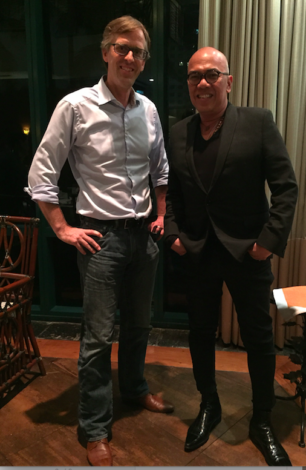
Every star has the “it” factor, but what is it that gives someone that “it”?
That was one of many conversations I had tonight with dr Boy Abunda over a three hour long dinner.
If you do not know who Boy Abunda is I can guarantee that you are not from the Philippines. In the Philippines he is Oprah, David Letterman and Ellen DeGeneres combined. He is “the King of Talk” and has interviewed everyone from Deepak Chopra to Miss Universe over an almost 30 year long career.
But tonight he was not interviewing anyone, if anything I was interviewing him.
Because a part from being a tv-talk show host he also runs a series of other companies including a talent management company that mangers all kinds of celebrities, from basketball players and actors to a celebrity dentist (!).
And it was from the perspective of both interviewing stars and celebrities, as well as helping to create them (as a talent manager) that I wanted to hear Dr Boy Abunda’s view on what it is that creates the “it-factor” – this elusive characteristic that makes someone have “star quality”.
I asked him to define this “it-factor”.
His first respons was that it can’t be defined. “That’s why it’s called the “x-factor”.”
That, of course, was a correct observation.
But I wanted to get an answer to a question that was not easily answered. I wanted to get closer to the truth. Catch the rainbow around being a star, if you wish.
So Dr Abunda kept thinking.
And then he replied: “It’s what radiates from you.”
“What is it that radiates?”, I inquired.
His answer surprised me and then delighted me.
He said: “Your story.”
He then elaborated: “People who have the “It-factor” have a deeper awareness of who they are. They are comfortable in themselves, in who they are and what they stand for.”
He continued to explain how he told the talents which he managers why no-one should ever try to copy some-one else’s singing style or acting style in an attempt to become a star, because it will never work since you do not have the background that made the person you are copying who they are.
The same is true for speakers.
Look at great speakers, learn from great speakers – but do not copy great speakers.
Instead dig deep into who you really are as a speaker, a person, a human being – as a soul. Then build yourself up as a speaker from there.
(Dr Abunda then added that this radiation that comes from knowing deeply who you are has to be nurtured with the tools of the trade, kind of like how a diamond has to be cut to shine to its fullest potential.)
What does star quality have to do with being a great speaker you say? And I say: A lot.
The ability to walk up on a stage and capture an audience requires a skill that is quite similar to possessing this “it-factor”.
Lesson: So as a speaker, try to dig inside to find your true story, the one that makes you radiate, so that you then can reach out with your message because people are drawn to what you have to say.
Bonus information: I also asked Boy Abunda about all the people he had interviewed and what made someone good to interview, and he replied that some people “have the gift of clarity”.
I found that profoundly insightful – and, I might add, very clear. 😉
The ability to get a message a cross in a way that people easily understand and take to their hearts is perhaps the most important skill a speaker can have. And to have it is truly a gift.
In all the speeches that you give, try to deliver them using the gift of clarity.
And then combine the two messages from Boy Abunda and you will have something truly powerful: A person who radiates while delivering a message that is communicated clearly.
I think you will agree with me that if you heard about a speaker who did that you would rush to get a chance to hear that speech.


